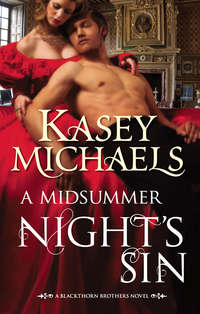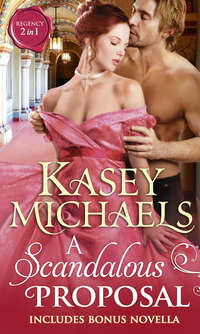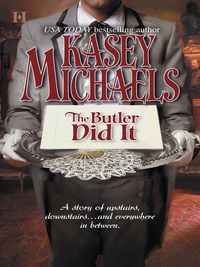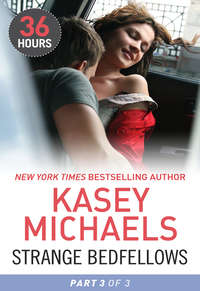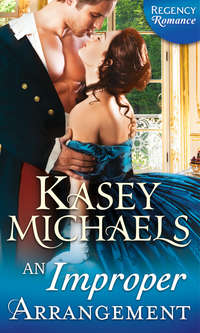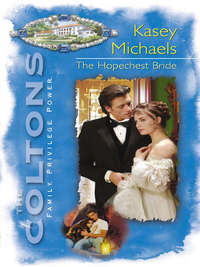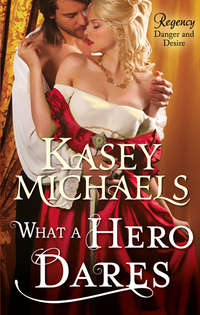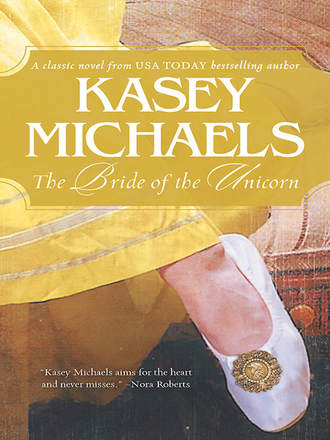
Полная версия
The Bride of the Unicorn
Not that she’d ever try such a thing. Peaches had taught her well, and Caroline had needed no more than one look to conclude that the Marquis of Clayton was no easy mark. The smartest way to deal with a man like him was not to deal with him at all.
“More tea, my lord?”
Caroline smiled as she watched Miss Twittingdon lift the crude jug and pretend to pour tea into the chipped tooth glass she had pressed on the marquis once the commotion in the hallway had fizzled to a stop and they had all adjourned to the old woman’s room.
“Thank you, no,” the man who had introduced himself as Morgan Blakely, Marquis of Clayton, replied, setting the glass on the tabletop. “I’ve had quite enough. And I must say, the cucumber sandwiches were extremely pleasing. It is always pleasant to indulge oneself in a hearty repast after a day’s journey, especially at this time of year.”
“And it’s clear as day that the man’s ta let in his attic,” Peaches whispered to Caroline, as the Irishwoman was sitting close beside her on the window seat. “I ain’t seen hide nor hair of any sandwiches—just them plates with spools of thread plopped on ’em.”
“It’s how we practice serving tea,” Caroline whispered back at her. “Sometimes Aunt Leticia gets confused. What I fail to understand is why our gentleman caller is going along with the sham. Kindness doesn’t seem to set easily upon his shoulders.”
“Don’t let the cove fool ye, Caro. If he’s bein’ kind, it’s only ’cause he’s loonier than her, that’s the why of it, and don’t ye know!” Peaches shot back at her. “I’ll tell you true. It was just leadin’ him on, I was, hopin’ ta gets a chance to see ye again, my dear darlin’ girl. Never believed his fairy tale fer a minute, I didn’t. Callin’ ye the lady Caroline and sayin’ ye was the daughter of an earl. Flippin’ batty, that’s what he is!”
“But he tells a plausible story,” Caroline said, tilting her head to one side and watching while the marquis appeared to listen intently as Miss Twittingdon told him of her plans for “Dulcinea’s Come-out.”
Peaches pushed a faintly disgusting sound through her pursed lips. “Plausibibble, is it now? And what sort of highfalutin word is that, Caro, I’m wantin’ ye ta tell me? I hardly know ye anymore, girl, and that’s a fact. Where did all m’good teachin’ take ye, if yer gonna be spoutin’ jawbreaker words no one can figure out?”
Caroline dipped her head forward slightly, then turned to wink at Peaches. “Ah, and it’s a glory to hear ye in a snit, don’t ye know,” she said, easily falling back into the lilting Irish brogue. “But it’s not ta go puttin’ yer hair in a twist ye should be, Peaches, m’love—yer Caro can still curse a fuckin’ hole in a copper pot at ten paces.”
“Ah, isn’t that lovely? Utterly charming.”
Caroline’s head snapped up. The marquis was now standing directly in front of her—and she hadn’t even heard the scrape of the chair as he stood. “Your veneer of civilized speech, as touted to me by Miss Twittingdon, slips with alacrity, Miss Monday, when you are confronted with the equally articulate—in her own way, of course—Miss O’Hanlan.”
“How did you do that?” Caroline demanded of him, not caring that the marquis had overheard her. “How did you get across the room without my hearing you?”
Morgan looked at her curiously for a moment, then smiled. “A veritable sponge, aren’t you, little girl? Sopping up the vernacular of the gutter, and the clipped accents of the gentry—and now planning to enlarge your education by requesting lessons in silent, economical movement from me. What new thievery are you planning, Miss Monday? Or am I incorrect in suspecting that our young miss of the pilfered oranges and stolen yard goods is at this very moment considering the benefits to be derived from being able to sneak up on unwary persons and filch their purses?”
Caroline pushed aside his words and his accusations with a wave of her hand as she concentrated on examining his feet—feet clad in high-top, hard-soled Hessians that certainly should have made some noise as he walked toward the window seat. “No, no,” she said dismissingly. “I was only thinking how wonderful it would be if I could learn to move so silently as I pass by the Leopard Man’s cell each morning. He always hears me coming, you understand, no matter how hard I try to be quiet, and it’s a considerable feat trying to race past before he can…um, before he can…”
“Yes? Please continue, as you have piqued my interest. Just what does this Leopard Man—is he spotty, to have earned such a name?—do as you pass by his cell each morning?”
“Dulcinea! You are not to speak of such things,” Miss Twittingdon warned her direly, although she did not rise from her chair, seemingly preferring to continue sipping her “tea.”
“Ah, go ahead, dearie,” Peaches prodded, giving Caroline a short poke in the ribs. “About time his worship got hisself a peek at the world most of us live in, and no mistake.”
Caroline looked past the marquis to see Ferdie Haswit, who was sitting cross-legged on Miss Twittingdon’s bed, his mouth stuffed with sugar comfits, nodding his agreement with Peaches.
“Very well,” she said at last, lifting her chin and glaring straight into Morgan’s bottomless-pit black eyes. She’d tell him the truth, and watch for him to flinch, to turn away in disgust. That would give her a true measure of the man. “His name is really George Ustings, but we call him the Leopard Man because he refuses to wear clothing, either summer or winter, and decorates himself by drawing circles on his bare body with his own excrement. Not that it matters, for everyone knows—or so they say—that lunatics can’t feel the cold or the heat. But to answer your question, in the mornings, when I am passing down the corridor in order to get through to the women’s side, George waits for me, then grabs hold of his—” She hesitated only momentarily, then swallowed hard, and continued, “He grabs hold of his cock, my lord, and speeds me on my way past his cell by chasing me with a spray of hot urine. I know it is hot, my lord, because George has very good aim.”
Her “party piece”—as Miss Twittingdon had once dubbed any public recital—completed, Caroline suddenly realized that she was embarrassed, not by what she had said but because she had used an innocent person, George Ustings, to her own purposes. No longer wishing to observe the marquis’s reaction, she lowered her eyes to stare at the ruby stickpin and asked, “Do you still wish to believe that I am the long lost daughter of these people, the earl and countess of Witham? Or perhaps you’ve changed your mind.”
She watched as Morgan lifted one well-manicured hand and removed the stickpin, twirling it between his thumb and forefinger as if the shiny bauble were some small treat he was about to offer her. “I do not recall putting forth the theory that I believe you to be Lady Caroline Wilburton, young lady. I’ve only said that Lady Caroline—an innocent child orphaned by the brutal murder of her parents fifteen years ago, to then disappear from the face of the earth and be presumed dead after an extensive search that undoubtedly included the countryside around Glynde proved fruitless—should be returned to the bosom of her still grieving family if at all possible. And, for my sins, I’ve decided that you should be that innocent child.”
Peaches pushed against Caroline’s shoulder and whispered none too softly, “Mad, his bloody worship is, Caro. Mad and bad. He don’t care a flip who ye are. It’s usin’ ye he’s after, and no mistake. Listen ta me, darlin’. Tell him it’ll cost him—tell him it’ll cost him dear.”
Caroline looked at Morgan Blakely’s clean well-shaped nails and at his strong hands that were free of chilblains.
He was so clean. And he smelled good. She felt certain he had never gone to bed hungry or been forced to tie down a screaming inmate while other, beefier servants administered emetics and purgatives to cleanse her system of ill humors.
Caroline’s gaze traveled from Morgan’s hands, past the glittering ruby stickpin, to his handsome, expressionless face. No, it was not completely without expression. She was certain that there was a hint of disappointment deep in his eyes. “You say you don’t care whether or not you have discovered the real Caroline Wilburton. But that’s a lie. You do wish to find her. I can see the longing in your face. So why are you still here, since you are already convinced that I am not she?”
The marquis lifted one expressive eyebrow, a movement that fascinated Caroline against her better judgement. He spoke quietly, so that only she and Peaches could hear him. “Why? That is a very good question. Perhaps I am terminally afflicted with an undeniable affection for happy endings. Perhaps I am no more than a bored English dandy out to enliven his life by stirring up a fifteen-year-old hornet’s nest. Or, just perhaps, my reasons are my own. If you wish to ask questions, Miss Monday, ask them of yourself. Which would you rather do—live as a rich heiress with the world at your feet, or continue to spend your mornings dancing out of the way of George Ustings’s squirting cock?”
MORGAN SAT ALONE in the private dining parlor he had ordered for himself at the Spread Eagle, the inn where he had decreed he and his odd party would spend the night before continuing on to Clayhill. As he sat nursing the snifter of warmed brandy he had requested of his host, he remembered Peaches’s declaration at Woodwere.
“Mad. Mad and bad,” she had said, and maybe the crusty Irishwoman was right. It was mad, what he was about to do, and he must be bad clear through to the marrow of his bones to be contemplating doing it. He felt dirty, soiled with a filth ten times fouler than anything to be found in the sweepings of the cells at Woodwere. But then, he had been to the depths before….
What he really could not justify to himself was the great length to which he had already traveled in his effort to revenge himself on his enemy. It was one thing to have saddled himself with a foul-mouthed, thieving foundling-home brat turned servant at a lunatic asylum. But to have agreed to drag along the insufferable, too insightful Peaches, as well as the sadly confused Miss Leticia Twittingdon and the morose (and quite easily remembered) dwarf, Frederick Haswit, was stretching the boundaries of credulity.
And yet, it was the only way he could persuade Caroline Monday to leave Woodwere—by agreeing to her demand to be accompanied by her friends and, lest he forget it, by turning over to her the ruby stickpin that had so lately adorned his cravat.
“Excuse me, my lord, but might I come in for a minute?”
Morgan, who’d had his back to the door, lifted his booted feet from the wooden table top and turned in his chair to see Caroline Monday standing directly behind him.
“I’m a quick learner, my lord,” she said, grinning, as his reaction to her quiet breaching of his private domain showed in his eyes before he could hide his surprise. “All it needs is to walk balanced on the balls of one’s feet. That, and to rid myself of my wooden clogs—something I would not do at Woodwere even if it meant risking a wetting from the Leopard Man. I cannot begin to tell you of the filth that is on the floors all over the public side.”
“Yes, I can imagine—and already have, as a matter of fact. And for the small indulgence of sparing me a cataloging of that assorted filth, Miss Monday, I vow you will have my undying gratitude,” Morgan drawled, moving his hand to indicate that she should sit down in the chair beside his. It did not occur to him to rise, as a gentleman should, until she was seated. “Now, what might I do for you? Are you having trouble sleeping? Shall I ring for our host to bring you some warmed milk, which you surely must be accustomed to having before you are tucked up in your comfortable four-poster bed? Or perhaps, if you merely find yourself at loose ends, you might like to mingle downstairs in the common room for a space, separating some of the local farmers who patronize the place from their purses. Anything I can suggest to ease your way to your rest. In other words, which Caroline Monday are you this evening?”
He watched as Caroline took her seat, a small smile flitting at the corners of her mouth. “You truly enjoy listening to the sound of your own voice, don’t you, your lordship? I had a terrible time calming Aunt Leticia so that she would agree to go to bed. She believes you are Don Quixote come to life, and we are setting off on a glorious quest. Ferdie is at this very moment composing an ode to your determination. But I believe Peaches has the right of it. She thinks you’re plotting something much deeper than rescuing an earl’s daughter and returning her to her family.”
Morgan took a sip of his brandy. “You know, Miss Monday, with more teeth and less dirt, Miss O’Hanlan might just consider making her living as a soothsayer. Yes, my motives run deeper than altruism. But they are no concern of yours. You are to be exceptionally well recompensed for being Caroline Wilburton.”
“But you don’t believe that I really am Lady Caroline.”
“Do you?”
Caroline sighed, the sadness in her tone not lost on Morgan. “No. No, I don’t. Lady Caroline Wilburton has to be dead. You said there was a wide search, a search that continued for a long time. They couldn’t have missed me, if I were she, now, could they, considering that these murders you spoke of were committed not twenty miles from the orphanage?”
“If there really was a thorough search,” Morgan heard himself say, then frowned as he wondered when his mind had given birth to that particular thought. After all, if the murderer had discovered a living Caroline, the child might then have identified him as the man who shot her parents. The idea lent more credence to the murderer’s seeming willingness to be blackmailed—and likewise provided additional weight to Uncle James’s rambling confession. “Miss Monday,” he continued smoothly, relegating that supposition to the more private regions of his brain, “as I’ve told you, you are to be well paid for participating in my plan to present you to the Wilburton family. I have already agreed to ride herd on your coterie of misfits as part of my payment for your cooperation. However, there is a limit to my patience, and your questions are pushing toward it.”
He watched as Caroline leaned forward and took an apple from the wooden bowl that sat on the table, rubbed it against her thigh, then took a healthy bite of it with her small white teeth. Talking around a mouthful of the juicy—and somewhat loud—fruit, she said, “That’s a pity, because I have several more questions for you to answer. How, for instance, do you explain the fact that my name is Caroline? Peaches told me that I supplied that name myself the same morning she found me sprawled in the mud outside the orphanage kitchens.”
Morgan lifted a cheroot from his pocket, stuck it in his mouth, and leaned forward, sticking its tip into the candle flame. “That’s simple enough,” he said, exhaling a cloud of blue smoke. “Our dearest Prince Regent married Caroline of Brunswick in 1795, shortly after which this entire island became knee deep in Carolines, with everyone from dukes to chimney sweeps naming their offspring after the new Princess of Wales. Do you have any more questions, or will you leave me in peace to contemplate the absurdity of this day’s events?”
He had to wait for his answer until Caroline had finished taking another bite of the apple, the sight of her small, well-shaped, yet badly chafed hands against the red skin of the apple and her obvious delight in the taste of the fruit making him believe he might possibly be slightly ashamed of himself.
Caroline nodded, chewing furiously, then wiped the back of her hand across her lips, where small droplets of juice had made them glisten. “I want you to tell me the story again, please,” she told him, her wide green eyes alive with interest. “I only listened with half an ear earlier at Woodwere. To tell you the God’s truth, for the most part I was lost to anything except the thought of escaping the place, once you said I might leave with you. Please.”
Morgan inhaled deeply on the cheroot once more, then blew out the smoke with a resigned sigh. “Don’t wheedle, Caroline. The role of supplicant doesn’t suit you.”
She shrugged her shoulders. “Arrogance suits you,” she said, grinning at him. ‘Peaches says you’re as proud as Paddy’s pig. You’re probably bursting at the seams with pride that Aunt Leticia puts you on a pedestal alongside her hero, Don Quixote. And Ferdie, he—”
“Oh, very well, brat,” Morgan interrupted wearily, “if it will shut you up and hasten your departure, I will tell you the story again.”
She stood up, depositing the apple core on the table, then sat down once more, her legs tucked up under her. “Start with the murders. Were they very gory?”
“The earl was shot in the back, if that makes you happy, brat, and the countess took a bullet in the chest, close by her heart. Oh, yes, the coachman was also killed. Did I neglect to mention that?”
Caroline leaned forward eagerly. “You did, but never mind. How were the bodies found?”
“The coach horses bolted, most probably thrown into a frenzy by the bark of the pistols. Also, the coachman seemed to have neglected to put on the brake.”
“He may have been too busy dying to think of it,” she interrupted, her eyes sparkling with interest and, Morgan decided unhappily, the keen basic intelligence he had already suspected, an unlooked for aptitude for deduction that might hinder as much as help him in the coming months.
“Possibly. Unless the person or persons who kidnapped young Lady Caroline deliberately set the coach rampaging down the dark road. Whatever, it lurched into the next small village along the roadway, two of the horses so injured by their mad dash that they had to be destroyed while still in the traces, and the villagers rode back down the road to make the grisly discovery.”
“Poor horses. None of it was their fault,” Caroline said, her small heart-shaped face wearing a woeful expression for a moment before she rallied. “Go on. There was no sign of the child, Lady Caroline?”
“None,” Morgan agreed, looking at Caroline curiously. She could listen, unmoved, to a description of the terrible murder of three human beings without batting an eye, yet was bothered by the destruction of animals. Was human death so commonplace in her life? He felt a faint stirring of pity toward her—it had to be no more than pity—then quickly, prudently, squelched it. “The woods lining both sides of the roadway were searched, on the off chance she was thrown from the coach when the horses bolted, but there was no sign of her. I was away at school—both my brother, Jeremy, and I—and we only heard about most of it in letters from our parents. But the late earl’s brother, Thomas, now the eighth Earl of Witham, spared no expense in searching for her.”
“Or so you heard,” Caroline broke in, pointing a finger at him, so that he noticed, not for the first time, that the nail was badly bitten. For all her show of bravado, for all her seemingly thick hide, the girl must have some vulnerability to fall prey to such a nervous habit. “Continue,” she ordered imperiously, so that he had to struggle to suppress a smile. “How long did the new earl search? Did he soon call it off so that he could enjoy his new position?”
Yes, the girl was smart, perhaps too much so for her own good—most certainly for his. “The new earl and his wife and son were devastated by the tragedy, and had the full sympathy of the neighborhood. There was a rash of arrests in the succeeding months, and many a highwayman hung in chains from gibbets up and down the roadway, although not one of them would admit to having taken Lady Caroline. But the murders had been committed in October, and with the coming of winter and several heavy falls of snow, hope for finding the child began to fade. In the end, there was nothing to do but assume that she was dead.”
“For fifteen years,” Caroline said, as if speaking to herself. “Yet you came searching for her—and found me. Why?”
Morgan abandoned his chair to move to the window and look out over the darkened inn yard. How much of the truth would he have to reveal in order to put an end to her questions?
He turned to face her, wishing her rather exotically tilted green eyes weren’t looking at him so closely, wishing that she didn’t look so vulnerable beneath her atrocious clothing and overlong mop of unruly dark blond hair. She was little more than a child, yet she had seen more in her few years than most old men. Could he, too, now use her and then discard her, as society discarded its orphans, and still live with himself?
“I met a man recently,” he began, deliberately tamping down any further misgivings about what he planned to do. “He was dying and made his last confession to me, including the admission that he had been involved in the disappearance of Lady Caroline. His last wish was for me to find her and return her to the bosom of her family, in expiation of his sin.” He smiled, spreading his hands wide as if to bestow a blessing on this dead sinner. “How could I, as a God-fearing Christian, refuse?”
Caroline looked at him levelly for some time from across the dimly lit room, then shook her head. “You’re lying,” she pronounced flatly. “Or, at the very least, you are not telling me all of the truth. But it doesn’t really matter, I suppose. I’m out of Woodwere, and Aunt Leticia, Ferdie, and Peaches are with me. I don’t need to know why you want to use me, as long as you keep your promise to take care of my friends.”
“Oh, so you noticed my reluctance to adopt those three sterling characters, did you?”
“I would have had to be blind as a cave bat not to,” Caroline returned, grinning. “They’ll be nothing but trouble, you know, even if they mean well. Except for Peaches, of course. She’ll be after your silver, bless her heart. So why did you? Adopt them, that is.”
That was a good question. Morgan, smiling thinly, squashed the cheroot into the tin dish holding a small candle. It had cost him a good deal of blunt to convince Woodwere that he could deal without Haswit and Miss Twittingdon, and he felt certain—as their relatives never visited anyway—that the director planned to continue to collect fees for housing them. “As soon as I have an answer for you, imp, I shall race hotfoot to report it to you.”
She uncurled herself from the chair and stood, tilting her chin at him defiantly. “You just do that, my lord. We made a bargain, you and me, and I’ll see that you stick to your end of it.”
Morgan stood and executed an elegant leg. “I am your servant, Lady Caroline,” he said mockingly, then added as he straightened, “although there has been one small alteration to my plans. I had not really counted on finding you—for from this moment on you are to consider yourself the true Lady Caroline—and my plans were more slapdash than well thought out. I cannot take you and the rest of our traveling freak show to Clayhill. It’s too dangerous, as I wish to keep your discovery private until I have groomed you sufficiently to take your place in London society.”
Caroline pulled a face, her mobile features turning mulish. “Aunt Leticia has been preparing me for my come-out for over a year. I know how to behave. I even know how to eat turbot.”
“My felicitations, Lady Caroline,” Morgan returned affably, watching as she scratched an itch on her stomach—an itch that probably signaled the existence of a family of fleas that had taken up residence in her gown. “However, Miss Twittingdon’s undoubtedly comprehensive instructions to one side, I fear I must insist upon some further education in the ways of the ton. To that end, and because my father no longer moves in society, either in London or here in Sussex, I have decided to move directly to The Acres, his estate. There we can prepare you for your reunion with your relatives without them immediately locking you up somewhere as a disgrace to the family name. Now, are there any more questions, or may I bid you a good night, my lady?”
Caroline looked at him through narrowed eyes, then quickly snatched up another apple from the wooden bowl. “I think I understand everything now,” she said, her grin once more turning her into a scruffy wood sprite. “Good night, my lord. I look forward to seeing your father’s house. Is Mr. Clayton as arrogant as his son?”


